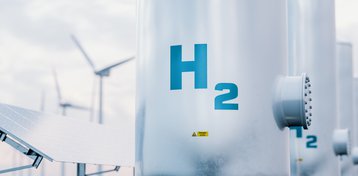Between Clarke Energy and Innio Jenbacher, we should be able to get a pretty good idea of how best to power our data centers, to ‘future-proof’ them against the net zero demands and collapsing supply chain.
Unfortunately, while they are in agreement that hydrogen is the power that will dominate the future, they were not full of reassurances that it would be a simple process.
According to Alan Beech, sales director in the UK & Ireland for Clarke Energy, the company has installed 7.2 gigawatts of energy, 1.3 gigawatts of which has been renewable energy including hydrogen.
While this is good progress, as Beech said: “We're going to need every technology out there if we're really going to meet these one-and-a-half degrees and net zero-type targets.”
The fact is that, at the moment, we are functioning within a severely constrained grid – boa constrictor of the Ukraine/Russia conflict, climate change, and supply-demand issues. Sadly, this means that for now, diesel is not out of the picture.
“There is a place for diesel, working with gas engines, batteries, energy storage systems, hydrogen, carbon capture, heat pumps, etc, because there's great talk about the electrification of the economy, but the grid is constrained at the moment,” said Beech.
“We can't get renewable energy from the Northwest of the UK down to where most of the demand is, in the Southeast of England. These constraints apply in Ireland, the UK, and in pretty much every developed country where there is going to be decentralized energy with hybrid-type controllers, which can be set up to be using the cheapest and typically the greenest energy at any particular time.”
Investors need to put their money into renewable energy sources, but in order to do so, there needs to be a realistic ability to produce revenue from it. An example of this that Beech elucidated, is wind power.
“The natural thing is to have electrolyzers next to these wind farms producing hydrogen, and that can be used for decarbonizing a difficult industry such as heavy transport construction. But, eventually, it will need to be stored for the winter period, which is still for two weeks, so there's no solar, and there's no wind. So hydrogen generators will become the long-duration energy storage that the nation needs and, specifically, data centers need.”
The fact is that, currently, data centers are part of the problem. They are energy-hungry buildings and they are only getting more greedy. If data centers could adopt this more decentralized energy production on-site, they could become a part of the solution.
However, hydrogen is not the simplistic solution we might be dreaming for. As Thomas Seeber, sales and commercial director at Innio Jenbacher explained, there are many different colors of hydrogen, and they are not all equal.
“There are various colors of hydrogen: green hydrogen, grey hydrogen, and brown hydrogen. Obviously, the only good one is green hydrogen, which is produced by renewable energy, with wind or solar,” explained Seeber.
“Currently, only five percent of the globally-produced hydrogen is green hydrogen, so there is a long road to go. It also needs to be produced at the point of use, because transportation is the next issue. Unfortunately, there are still some hurdles. The question is, do we need to have an infrastructure already available for hydrogen, or is it maybe just a vision that we're currently working towards, where maybe in some years hydrogen can replace some of the fossil fuels?”
There are some solutions to this. For example, Innio Jenbacher recently upgraded a smaller one-megawatt engine so that it could run on natural gas, hydrogen, or a mix of the two. This flexibility opens up options for now, as well as for the future.
“Hydrogen is expensive at the moment, we know that. But we are just proving that it's possible for existing assets to run just as well on hydrogen fuel in the future. I'm not saying that hydrogen will solve the problems globally for all customers. But for some customers, hydrogen might be a valuable solution going forward.”
Ultimately, hydrogen is not perfect, but it does work, as long as the infrastructure is there to support it.
Beech compared hydrogen to some of the other ‘green alternatives’, but the fact is that when it comes to reliability, there is no real competition, and this is something that has been proven in the last year alone.
“Hydrogen has lots of critics. But really, it's the only silver bullet we have that can satisfy long-duration energy storage. We have long spoken about hydroelectric, but this year the droughts that we've seen have caused problems with hydroelectric energy.
“Nuclear power stations have had to shut down or slow down because they can't get the cooling water, and even the German coal power stations couldn't get the coal down the Rhine, because the Rhine's been at such low levels, the barges weren't able to deliver it.”
The data center industry is mission-critical, and because of that, we need solutions that are robust and long-lasting. Hydrogen has its setbacks, but in the long-term, it could be the solution to a greener future for our industry, and our planet.
Tune into the full DCD>Talk to find out more about Innio Jenbacher and Clarke Energy’s projects


